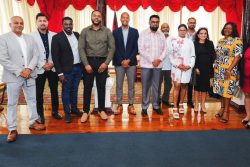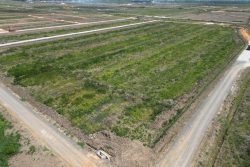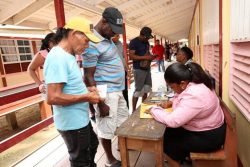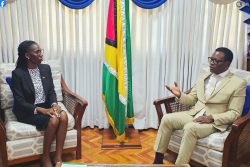Dismantling the political control over the elections machinery, enforcing stronger campaign laws and updating the results declaration process are among overdue reforms needed to overhaul the electoral system, according to the Electoral Assistance Bureau (EAB).
In a report on recommendations on electoral reforms, based on lessons learned from the elections held from 1992 up to last year, the EAB says that the electoral system is still weak and it proposes a raft of legislative, administrative and educational reforms to minimise the instability that now characterises voting in Guyana.
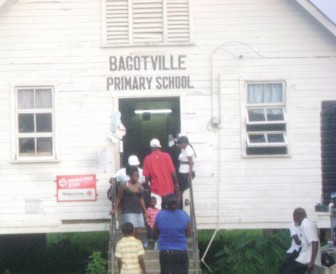
“The recent 2011 General and Regional Elections, despite reflecting the overall will of the people, demonstrate that twenty years after hailing the installation of democracy in Guyana, the electoral system is still vulnerable in ways that make the democratic choice it affords to the people of Guyana a fragile and threatened one,” the EAB says. Recommendations for fixing these problems that have been put forward by the EAB, international observer organisations, and some other civil society groups have been “repeatedly ignored,” it points out. “The financial, emotional, moral, and physical costs as well as loss of innocent human life in the past twenty years that has resulted from election-related conflict have to be seen in their aggregate and taken seriously enough so that steps can be taken without delay to protect the people of Guyana and future generations from unstable electoral periods,” it warns.
According to the EAB, the electoral process is beset by a “chronic lack of enforcement” of the electoral laws, which are themselves deficient; administrative procedures that have not been updated; and an electoral machinery “pinned under the thumb” of political parties.
In addressing the control that the parties have over the Guyana Elections Commission (Gecom), the EAB says that the machinery that enables the decision-making process that allows citizens to select their leaders should belong to the people, not the parties. The commission is made up of three members nominated by the government and three nominated by the opposition parties, while the chairperson is selected by the President, based on a shortlist made by the Leader of the Opposition.
“A body guided by partisan political forces suffers inevitably from the very dynamics that govern inter-party relations in the broader political realm,” it says, having noted that the arrangement proposed by President Jimmy Carter to late former President Desmond Hoyte in 1991 for commissioners to be appointed by political parties was rooted in its historical context. At the time, it says, the political system was only just being opened up and elections were being taken out of the control of the Home Ministry under the then PNC government. “It was not then, and it is not now, an ideal solution. In every election following the 1992 elections, the flaws in this approach have been palpable,” it adds, while pointing to disparity by the commission in its treatment of parliamentary and non-parliamentary parties, among other flaws.
The EAB argues that the conflict of interest for political parties, the legitimate custodians of the legislative process, to administer the laws they legislate, while simultaneously contesting the elections they administer may explain why campaign finance laws have never been enforced.
As a result, it recommends setting up Gecom as an independent civic body by civic entities and financed directly by the Parliament, including a political affairs committee to ensure representation of the political parties, and a grievance mechanism to manage conflict between the parties and Gecom during the elections process.
Preventing misuse
Other reforms proposed include updating and enforcing the laws governing campaign finance, the use of state resources and media access to ensure a level playing field for political campaigns. Though outdated, the current law on campaign finance and regulations to address fairness among political parties has never been effectively enforced, the EAB says. It found that the failure to enforce the laws governing the maximum amount of funds that could be spent on political campaigns has been “systematic,” while pointing out an absence of regulations to aid with separating the state work from that of the incumbent.
“Campaign finance is a critical issue in Guyana for a number of reasons: internal travel is very expensive and there is an inherent bias against smaller parties when it comes to raising finance to campaign in remote areas; there are no existing laws or regulations for public disclosure, which allow for the public to clearly distinguish between work of the state and those of the incumbent political party in the pre-elections period; there are no clear legal guidelines for determining when the use of state funds constitute a misuse of public funds by the incumbent; there is no requirement for public accounting by political parties,” it explains, adding that the elections in the last two decades reinforce the status quo by unfair weighing of financial strengths.
At minimum, the EAB says new laws should include a legally defined campaign period and sets of activities that constitute a campaign; a revised maximum sum that could be spent on political campaigns; and a requirement that each political party submit their campaign budget with specific activities at least one month prior to the start of the official campaign period. It envisages that parties should be required to report midway of the campaign period and to submit a final report within one week of conclusion of the elections.
Moreover, the EAB believes that the legislation should address the persistent opposition concerns that the incumbent misuses state resources for campaign purposes. It proposes that the legislation should detail a full set of specific ways in which state resources cannot be used during elections campaign periods and a series of penalties for violation. The incumbent, it adds, should table in Parliament and publish six months in advance of the elections all projects, which would be carried out by the state, the sums that would be spent, and the activities that would be conducted. “The incumbent should also publish all visits that would be made to hinterland communities, their specific purpose, the main activities that would be undertaken during visits, and budgets per visit,” it adds, further saying that all the information should be published in the Official Gazette and via radio, television, newspaper, and official circular to each hinterland community. State activities and hinterland visits according to the published work plan and budget should be monitored, the EAB adds, saying penalties should be levied for violations.
In addressing media access, the EAB argues for specific rules that create fair and equitable media access of all political parties to both privately and publicly-owned media. “The matter of equitable access of the populace to the media has to do not only with the balance and accuracy of stories produced by the media but also the different types of media that are available to communities across the country,” it says, while noting that radio has the greatest reach, including in several indigenous communities in remote areas, but has been largely under the control of the state and the state owned media has demonstrated a bias towards coverage of the incumbent party. In this context, it says legislation on fair and equitable media access needs to treat with radio access in greater detail than other forms of media so as to ensure equal coverage and caps on coverage time for political campaign programming on radio as well as adequate protection of the public from wilful misuse for the purpose of fomenting strife and violence.
In addition, the EAB is also proposing enforceable rules of conduct for political parties as well as for media operators. While current codes of conduct are non-binding, the EAB says they are not effective and should be made enforceable with requisite sanctions included.
Preliminary results
The EAB also sets out proposals for reforming laws on totalling and declaring the official elections results that would see preliminary declarations made regionally, prior to Gecom’s official announcement. The delays in the current system, which does not take into account relevant technologies that are available, are highlighted. Although results are published outside of every polling station immediately after the count is complete, Statements of Poll (SOPs) are transported to Gecom’s headquarters, where seats are allotted to parties before a declaration is made.
As a result, the EAB recommends the laws be reformed to allow and require the preliminary declaration of results to be done for each region or sub-region prior to the official declaration of counts and seats at Gecom’s headquarters. It also proposes that the laws be updated to allow electronic photography and secure posting of SOPS that are pasted up outside of polling stations directly onto Gecom’s website before the hard copy of the SOP is taken outside of the polling station and posted on the wall for the public. “The public, Gecom’s Headquarters, and all political parties should have access to Gecom’s website where the SOPs are uploaded by polling stations. The technology to achieve this is simple and given the Government of Guyana’s plan to provide Internet access to rural communities, the majority of communities in the country would be able to post the results of their SOPs,” it says.
It also proposes that a data processing centre be set up for each electoral sub-district or region/district, explaining that the electronic tally of elections results should be done at the Returning Officer’s location in each electoral sub-region and not at Gecom’s headquarters. It says too that the Returning Officer for each sub-district/region should declare the preliminary results out to the public and the declaration should be done via the radio and web and should carry not only the signature of the Returning Officer but also the signatures of the representatives of political party and observers involved in the SOP verification and data entry observation process.
Will to drive change
Saying that the needed electoral reforms have to be acted upon without delay, the EAB notes that some of the issues that cropped up last year were not new. “Some represent a backsliding in the demonstrated commitment of the largest political parties to the basic principles of democracy and respect for citizens of the county. However, the electoral system continues to be plagued with problems that have arisen in past elections,” it says, while adding that it would be irresponsible to go to another election without an overhaul of the system. “In the EAB’s view, the country now has twenty years of evidence of the weaknesses of its electoral system and that is a very long time for not having fixed some very basic problems,” it adds, saying that this situation suggests that the lack of will is one of the underlying problems.
Moving ahead, it argues that the process cannot be spearheaded by Gecom or political parties, since this would constitute a fundamental conflict of interest. “The challenge of building a more stable electoral system, one that delivers, that is truly free and fair and free from fear is largely for the citizens and civil society groups. The citizenry and representative bodies in civil society need to be more proactive and to collectively take up the challenge to work for reform of the electoral system,” it says, while saying that the process has to involve Gecom and the political parties but must be open and plural.
As a result, the EAB proposes a broad-based professional national task force, comprised of adequate representation from civil society, local communities, and political parties, be set up to review and finalise, taking into account all of the recommendations made by local and international observers since 1992.
In addition, it says Parliament should set up a temporary coordinating body solely to handle logistics of the electoral reform participatory processes, with open forums to receive input from political parties, the business sector and non-governmental and non-business oriented civil society bodies.
“The success of any electoral reform initiative would depend on the will of all sectors of society and would show their commitment to building a truly stable and free and fair electoral system. The success would also depend on willingness of organisations to work collaboratively for common national goals and not pursue narrow interests. Ultimately the success of this initiative would rest on the drive, dedication, and leadership provided by civil society leaders and elected leaders,” the EAB adds.
